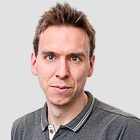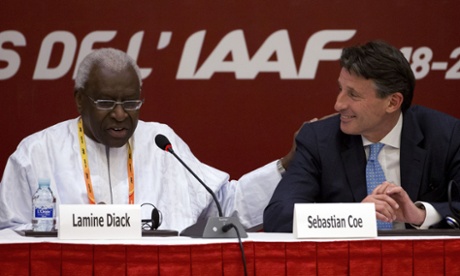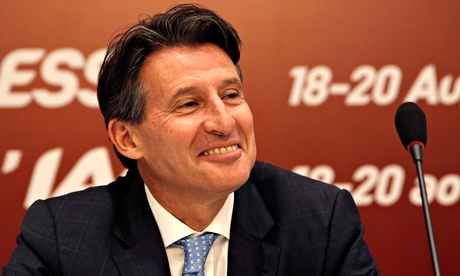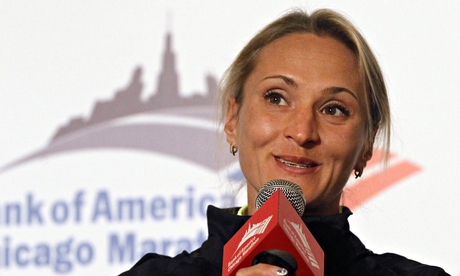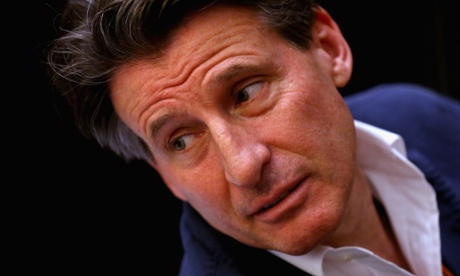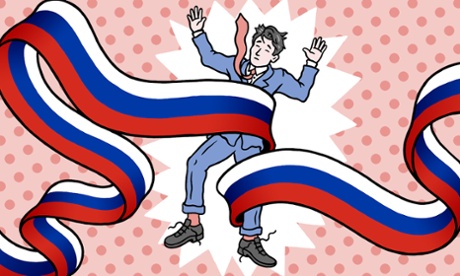So as the MPs leave the room, that is me done ...
Coe is asked whether he will allow a 2011 academic report which suggested that nearly 30% of athletes might have doped to be publishes. Refuses to answer directly. The chair Jesse Norman calls an end to the session after two hours and 56 minutes.
We are nearly three hours in now. Coe is asked about his conflicts. “I could not be more transparent in what I do,” he says.
Paul Farrelly asks: How do you know the whole Qatari bid for the World Championships in 2019 is clean? Coe waffles. Farrelly again: “Will you investigate?” Coe waffles again. “Farrelly: “I’ll take that as a no.”
Updated
Paul Farrelly says the only reason that Eugene was in the game for World Championships was because Nike are saying they are wanting it. Says Eugene is the same size as his constituency of Newport and they are not credible hosts for a World Championships. Should Newport bid for World Championships too, he asks. Coe glowers at him: “You can try.”
Coe asked about why he didn’t consult ethics commission before voting over Eugene 2012. Says bidding process different, plus they knew he had nothing to hide over Nike links.
Coe on thin ice here over whether he should have voted on Eugene decision.
— Owen Gibson (@owen_g) December 2, 2015
Coe asked whether he took advice from Nike before supporting Alberto Salazar in the wake of the BBC Panorama documentary. Says no.
More discussion and probing about the decision to chose Eugene 2021 to host the World Championship without a bidding process. Coe confirms he voted for Eugene 2021. A “strategic decision” he calls it.
Coe now denying Bjorn Eriksson's interpretation of their 'perfectly reasonable' phone conversation last week
— Matt Slater (@mjshrimper) December 2, 2015
Updated
Damian Collins tells Coe: You could have said to the Nike executive who asked about Oregon 2021, I don’t think this is appropriate given your conflict of interest? Coe says the advice he gave to Oregon was no different to that he would have given to any other city. Denies again a conflict of interest.
We are finally on to Oregon. Did Nike have an interest in hosting the World Championships in Oregon 2021? “I don’t know, you’d have to ask them that,” replies Coe. Says he discussed bid with Nike executives “because I was asked”
Jesse Norman rightly points out that listing a conflict of interest doesn't make it any less of a conflict.
— Matt Slater (@mjshrimper) December 2, 2015
Updated
Coe is finally asked about Nike. Would it have not been better to have ended the relationship at the election? Says the relationship with Nike has always been identified, and points out that he was chairman of the organisation committee for London 2012 when Adidas were the partners. True. But Coe doesn’t seem to grasp that given the seriousness of the charges against the IAAF, he has to be seen to be whiter than whiter and to avoid a conflict of interest. As Coe puts it when asked if there is a conflict of interest: “I would have to say that is a challengeable point.”
Coe asked if he should've ditched Nike sooner: “If I thought the noise would have escalated to the level it did, yes I probably would have."
— Ben Rumsby (@ben_rumsby) December 2, 2015
Updated
John Nicholson is back. Have you ever been offered a bribe. No. Do you know anyone who has been offered a bribe? No. Isn’t that extraordinary? Coe: “People who are doing corrupt acts don’t often share it.”
Is Coe seriously saying he has never heard rumours of anyone being offered a bribe in his entire career in sports politics? Hmmm.
— Owen Gibson (@owen_g) December 2, 2015
Updated
Coe admits: “I did not ask the president about his son [Papa Massata Diack].” Paul Farrelly asks why Coe was not curious, suggests it was wilful blindness and points out it wasn’t the first time he had been involved in bribery allegations ...
'Did I lack curiosity? I don't know. Never thought about it.' #Coe
— Richard Moore (@richardmoore73) December 2, 2015
Updated
Coe is finally questioned about Lamine Diack, and why he called him “a spiritual leader” in August ... Coe replies that he wouldn’t have said it now. However he heard “no whispers” about Diack’s alleged misconduct. Interesting admission given IAAF offices were raided in June by police looking for evidence of Diack corruption.
Updated
Paul Farrelly MP says that IAAF’s response has been defensive ... and that it has valuable PR lessons to learn. Also asks about how long Gabriele Dolle, the former head of its anti-doping unit, who is being investigated for corruption was in charge of checking athletes. Agrees it was around 2001.
Jesse Norman asks Coe why he is not praising whistleblowers for opening up “an extraordinary cesspit”. Coe: “I have actually said it before, but let me put it on record [about what they have done], whistle-blowing comes with enormous costs”
John Nicholson - a former BBC and ITV journalist - first MP to properly fluster Coe on whistleblowers, under-age doping etc.
— Matt Majendie (@mattmajendie) December 2, 2015
Seb Coe is asked about protecting kids: Says: “Using performance enhancing drugs is a) unnecessary, b) dangerous, and c) cheating.”
This is a telling comment from Steve Magness, the main whistleblower in the BBC Panorama documentary about Alberto Salazar.
Coe backtracking on whistle blowers. Appears to be saying he was encouraging and thankful, not dismissive.... I don't quite remember that...
— steve magness (@stevemagness) December 2, 2015
Seb Coe says he hasn’t had any discussion with Russian athletics ... says he is waiting for structures to come in place first.
John Nicolson (at last) asking some probing questions about Russia and whether they can be trusted to clean house.
— Owen Gibson (@owen_g) December 2, 2015
Coe is getting more flustered now ... asked what are structures that would protect a Russian whistleblower. Doesn’t really have an answer.
Coe not doing a great job of explaining why he has not yet met with the Stepanovs.
— Owen Gibson (@owen_g) December 2, 2015
Much better questioning now. Coe is asked by the clued-up SNP MP John Nicholson why the Stephanovs - the main whistleblowers of the ARD documentary about Russia’s doping - are in hiding. Coe says he doesn’t know. MP responds: “I think we know why they are in hiding.”
Coe is asked whether he refused to meet Hajo Seppelt after his first documentary and slammed down the phone on him. “No, that’s not true. I did say on record that ARD brought to the attention of the sport of those particular challenges. And I remind you that early on the IAAF had confirmed its ethics committee was underway and Wada then set up its ethics commission.”
Coe is asked about the senior IAAF officials who are accused of corruption, embezzlement and more. “This is a very serious set of allegations but this is the subject of a criminal investigation. So I am not in a position to add anything to this. But if the allegations against IAAF officials - and let’s make it clear they are abhorrent - are proved, it will be a matter for the police.”
Updated
Coe has still not been questioned about Salazar, his links with Nike, his affection for Lamine Diack ...
These 10 MPs are taking time out of a debate about dropping bombs for this. And it doesn't feel like a great use of time so far #coe
— Matt Dickinson (@DickinsonTimes) December 2, 2015
Coe asked again why athletes don’t make blood data public: “This is a very complex process. By sticking information in the public domain, which is shared with Wada, would this be risky for the reputation of clean athletes? I think it would.”
Updated
More Coe: “My father would have killed anyone who told me to take anything that was performance enhancing. That is the vast majority of athletes live in and are comfortable with.” Insists that when he competed that applied to the rest of the British team which was clean.
Andrew Bingham tells Coe: You were king of the world after London 2012. Your reputation is back on the line now. Do you really think you can break this culture. “Yes. I have to. Because if I don’t there will be no tomorrows for this sport.”
Coe asked if event organisers should be made aware of athletes with high blood scores (medical reasons): “It’s something that I’ll ponder.”
— Ben Rumsby (@ben_rumsby) December 2, 2015
Updated
Coe is asked whether athletes should publish their blood data: “No, because, again, this information is confidential to the athletes.”
More questions about allowing doped athletes to compete. Capdeveille drones on a little, but says there were only four cases before London 2012 not 10 as thought, and they involved one medal not two.
Coe is asked about the Independent Commission report which said that the IAAF allowed 10 athletes to compete after they had failed a doping test. Coe: “If there have been delays in the system, and they have been caused by the abuse of that system, then we will address them.”
No mention of Nike or Eugene yet with Coe. Assume it's coming
— Matt Lawton (@Matt_Lawton_DM) December 2, 2015
Coe is asked whether he thinks the IAAF is a corrupt organisation. “No it is not. I don’t believe across all the organisation is corrupt.”
Coe is asked about the culture of athletics. For the THIRD time he mentions the fact that he joined an athletics club as an 11-year-old. “I am sorry to be repetitive hear but this has emotional connection for me,” he says. “I joined an athletics club at the age of 11. My coach, when he died, his wife told me that the only day he wasn’t coaching was Christmas Day. The question I have been asking myself in the last few weeks is, how have we gone from that to the horror show that has played out in the last few weeks? I don’t know the answer to that but we will find out.”
Coe is asked about the recent Independent Commission report to Wada which said that within the IAAF there was an acceptance of cheating: “I really don’t accept that ... I don’t recommend that remotely”.
Coe asked about his ‘Olympic dividend’ - which will give every 214 federations $100,000 over four years (which certainly proved to be a helpful sweetener to countries thinking of voting for him to be IAAF president). At first Coe denies that it is $100,000 per country. Then he claims that he heard stories of small islands unable to send athletes to world championships, and was right to help them. He is asked whether the money might be better used elsewhere, but he is able to wriggle free.
Coe denies offering $100,000 to each IAAF association if he was elected president. Um.. https://t.co/j3hxG4ZmV0
— Ben Rumsby (@ben_rumsby) December 2, 2015
Updated
Jesse Norman says to Coe - there is no doubt that the second Pound report will be critical of the IAAF, is there? Coe: “I really have no idea,” replies Coe. That is being disingenuous. Coe surely knows it is going to be incredibly critical of several former IAAF officials. I certainly do.
Matheson asks Coe if he has suspicions about other federations? “This is not simply about Russia and it is not about athletics,” says Coe. “I will await Dick Pound’s second report with interest”. Says he doesn’t know what will be in it. Matheson letting Coe a little bit off the hook here.
Coe is asked was Russia ever clean? “I don’t know the answer to that”. Points out that what was going on in Russia in the 60s, in terms of drugs, was probably not much different than US campus’s in the 60s.
More questions from Matheson about whether Coe to spend more to make the sport cleaner and less corrupt. Coe’s reply: “I’ll do whatever it takes to make sure we have proper systems in place, and if it means doubling our budget then we will find the budget.”
In fact, Coe has promised to fix things so often I've now got the Bob the Builder theme tune on internal loop.
— Owen Gibson (@owen_g) December 2, 2015
Updated
The Labour MP Chris Matheson asks Coe would he introduce term limits for the IAAF? Coe replies: “Yes, that is going to go ahead.” He is slightly letting Coe off the hook here by asking what else he is going to do to reform the IAAF. Coe gives a long-winded answer about what he is doing to improve corporate governance.
Coe denies he did little on the job to tackle doping. Lucas asks him directly: did you raise doping while you were on the council? Coe: “We all raised them... we were told there would be follow-up action by the anti-doping unit. Was too much power invested in too few people? Yes.” But says the same is true across sport.
Coe says IAAF anti-doping budget $4m. "I will double the budget if I have to"
— Paul Kelso (@pkelso) December 2, 2015
Updated
Coe is talks about what he is doing to secure athletics future. Coe replies: “What do I want out of this? I want a sport can again trust. I can put these systems in place ... but returning trust to the sport is going to be a longer journey.”
Lucas asks Coe about corruption at Fifa and points out that he was an insider at two allegations “bedevilled with corruption for many years”. Why, says Lucas, should we think you are the man to fix athletics’ problems. “Because I have the experience to do that”. Lucas interjects: “You didn’t ask the tough questions in 2007?” Coe goes back to restate his case for fixing things. Adds: I am absolutely focused on doing that, and if I don’t there will be no future.”
Coe goes on to talk directly about IAAF’s response to drugs. “Was it adequate? No. Are their failures? Yes. Will we fix them? Yes.”
Coe asked why he didn’t do more to tackle doping after becoming vice-president in 2007. Says he was given a clear remit in the council to concentrate on providing a successful athletics programme at London 2012. “This was a non-operation role,” he continues. “These are very serious allegations. I am not walking away from it ... but these are not allegations that would have come across individual council members.”
Lucas: has the IAAF taken action fast enough following you going into the IAAF as an insider to deal with the issue of blood doping? Coe goes back to his stump speech about what he has done since becoming president. Lucas cuts him down, wants him to answer the question. Coe replies: “Am I satisfied on the follow-up tests and the action of the organisation to chase down the cheats? Yes I am. Are our systems perfect? I am sure they are not.”
Now Ian Lucas asks his first question. Starts by asking Coe when he became IAAF vice-president and involved with Fifa’s ethic committee. Asks whether he was aware of allegations of blood doping in 2007. Coe says he was, but not the specific numbers. Also points out that the vice-president role only involves 10 days a year.
Coe seemingly asking himself almost as many questions as the members of the select committee.
— Matt Majendie (@mattmajendie) December 2, 2015
Updated
Norman: let’s assume there are 14% of athletes of doping, why isn’t the IAAF being stronger in pursuing possible 700 cheating athletes? Again Capdevielle answers the question with a lot of waffle. Norman responds: “I don’t think you have answered the question”.
Collins: why did you take such a strong view against using blood data before 2009? Capdevielle: “We tried ... but we failed before the Court of Arbitration for Sport”.
Coe and Capdeveille are asked a series of questions about why blood doping cases from 2001 and 2009 - when the athlete biological passport was introduced - can’t be investigated. Coe and Capdeveille says no. But on Saturday the anti-doping expert Michael Ashenden pointed to the case of the German speed skater Claudia Pechstein, who was sanctioned outside of the athlete biological passport, as showing it was possible. Capdeveille says from 2001 and 2009 the IAAF was collecting bloods for screening data and to see whether due follow up was needed.
The BBC’s Dan Roan tweets: Reporters told that if they want to attend future @CommonsCMS hearings, they must not talk to Coe when he leaves the room.
Reporters told that if they want to attend future @CommonsCMS hearings, they must not talk to Coe when he leaves the room
— Dan Roan (@danroan) December 2, 2015
Updated
Damian Collins says the prevalence report saying 14% of endurance athletes cheat is based on academic research into 5,000 athletes and is a “robust piece of work”. 14% would mean 700 athletes being caught - yet only 200 have been enough. Is enough being done?
IAAF anti-doping manager Thomas Capdevielle says they have done more compared to other sporting organisations. Adds: “We followed up duly according to the protocols at place at the time.” Coe insists suspicions “are being followed up”.
Coe is asked about the IAAF’s blood database: “This is a shared database, this isn’t something we sit looking at - all that data is shared with the World Anti-Doping Agency so if there are concerns then they are absolutely shared with WADA.”
Coe is asked by Damian Collins does he regret using the phrase ‘declaration of the war’ about journalists who raised concerns about blood doping. “It probably reflected my frustration at the time,” he replies. “I was being contacted by clean athletes and coaches around the world who were having their reputation impinged ... but this was never about an attack on the media. It was specifically aimed about how clean athletes. Paula Radcliffe is a very good example.” He is asked again whether he regretted it. “I stand by the sentiments but I probably would have used different language,” Coe admits.
At DCMS hearing, @SebCoe say IAAF listens to journalists. In 2013 they ignored journalists. Completely and totally. pic.twitter.com/HgJ38mXL65
— sportingintelligence (@sportingintel) December 2, 2015
Updated
Coe is asked why he didn’t reach out to journalists who had concerns about doping: He slightly dodges the question at first by looking forward. “The changes I will make to the ethics code will make it easier for whistleblowers to raise their concerns,” he begins. “I know that whistle-blowing comes with human codes, so this is very important to me”. Coe also claims he told ARD to hand over their documents to the IAAF -- which is a bit odd given the Hajo Seppelt, the ARD documentary maker, told me outside that he had tried for months to get to speak to Coe. Coe admits: “There are failures, but we will listen”.
Updated
Coe adds: “I will die in a ditch for media groups to challenge my motives, but the issue I took exception to was the very selective use of data to prove positive tests.”
Updated
Coe is asked “was he wrong” to make his declaration of war comment ... Replies: “There are three different issues here. We are dealing with the issue of a management of a blood database, there is then the issue that has arisen from the Independent Commission of Wada about Russia, and there is a third issue that has allegedly implicated a handful of people at the IAAF at being complicit. The issue I was trying to make at the time was the reckless use of a database to actually imperil and put at the risk the reputation of clean athletes and Paula Radcliffe’s treatment is a clear example of that.”
Coe: 'We welcomed press intrusion [during Olympic preparations]. It made us a better organisation'. Think he means 'reporting'
— Ian Prior (@ianprior) December 2, 2015
Updated
Coe is asked whether it is right that IAAF thinks 14% of athletes are doping. Coe and IAAF anti-doping manager Thomas Capdevielle waffle a bit, talking about a prevalence report, prompting Norman to ask: so what’s the answer, higher or lower? Capdevielle says other organisations do less than the IAAF and “there is a danger of over-exaggerating” the amount of doping in athletics. Coe says he doesn’t know if “14% is right”
Norman continues his questions about blood doping. Should it be a criminal offence? Coe replies that he authored a report in 1988 about this subject, but he has a concern about criminalising athletes. Says it is difficult placing criminal system against a sporting system, and it should be a sporting sanction not a criminal suspension.
Coe replies: “It is about trust ... between the audience, sponsors, coaches and athletes ... if there is a sport that shows that any ambivalence towards doping, parents will find other sports.” Adds that the IAAF has a duty of care to clean athletes to create structures and a landscape ... to weed out the cheats”
So we are about to start ... Lord Coe sits down along with IAAF anti-doping manager Thomas Capdevielle. Committee chairman Jesse Norman starts by asking what his personal view of blood doping and why he thinks it is wrong.
Updated
Preamble
Welcome to the Grimond Room, Portcullis House, where IAAF president Seb Coe is about to face a grilling from MPs from the Culture, Media and Sport select committee over athletics’ myriad problems.
Issues expected to be brought up today include:
• did the IAAF either cover up cases of blood doping or were they too slow to react to potential concerns?
• Lord Coe’s response to criticisms of the IAAF both as president and Vice President of athletics’ governing body
• Lord Coe’s relationship with Nike
• Lord Coe’s relationship with Mo Farah’s coach Alberto Salazar, who was accused of violating anti-doping protocols by Panorama last June.
There is a large group of journalists waiting outside for Coe to enter. Among the press pack is Hajo Seppelt, the German documentary maker who helped exposed systemic doping in Russia, and Mark Daly, the BBC reporter behind the Panorama documentary against Salazar. It promises to be an interesting couple of hours …
Updated

